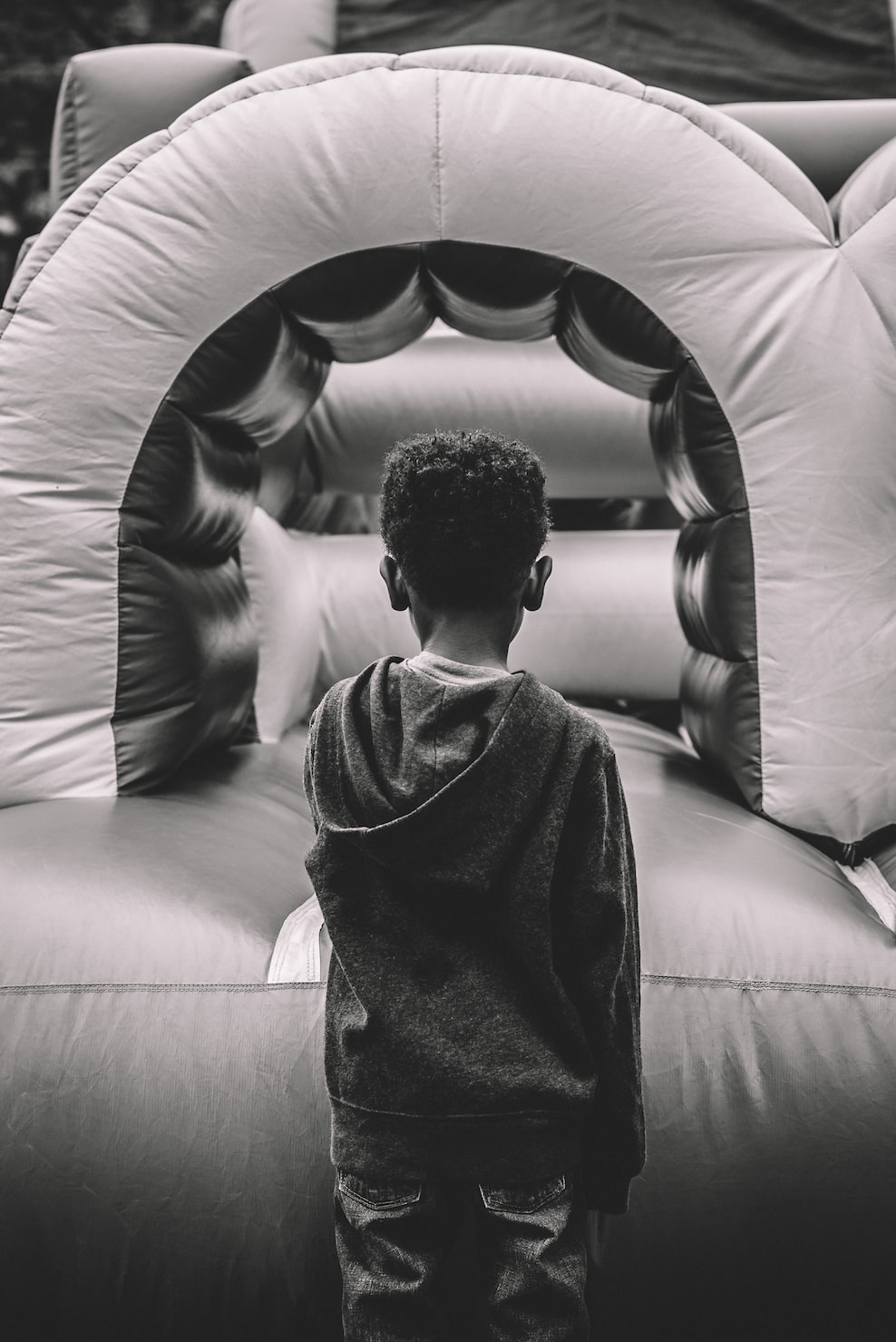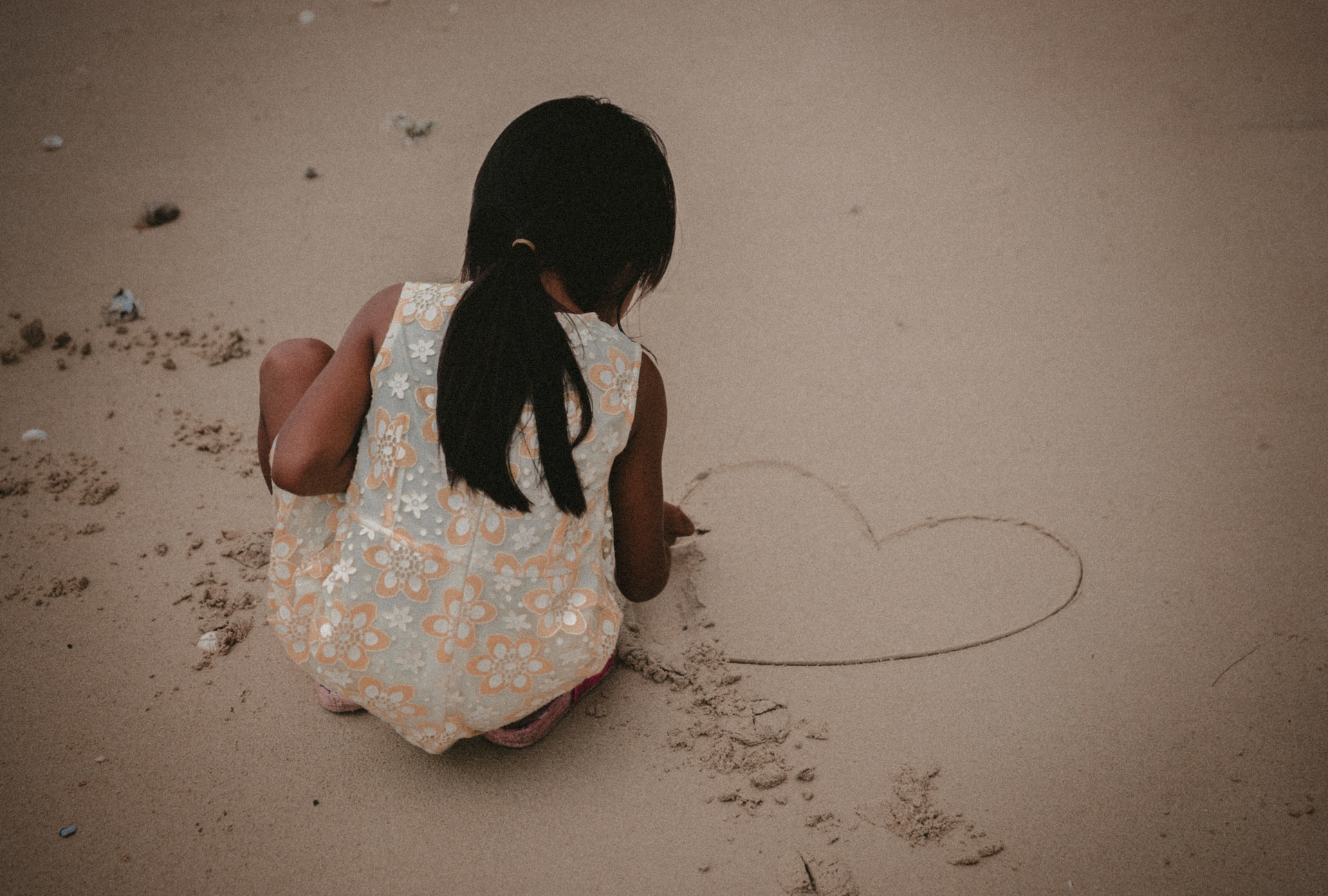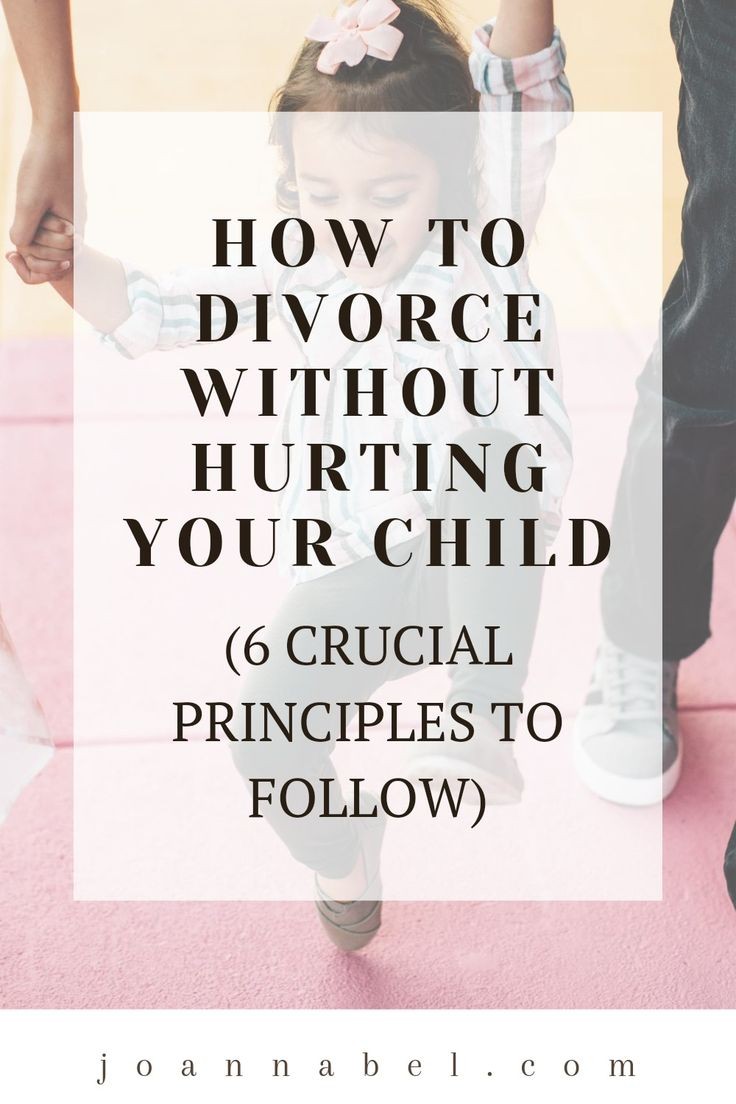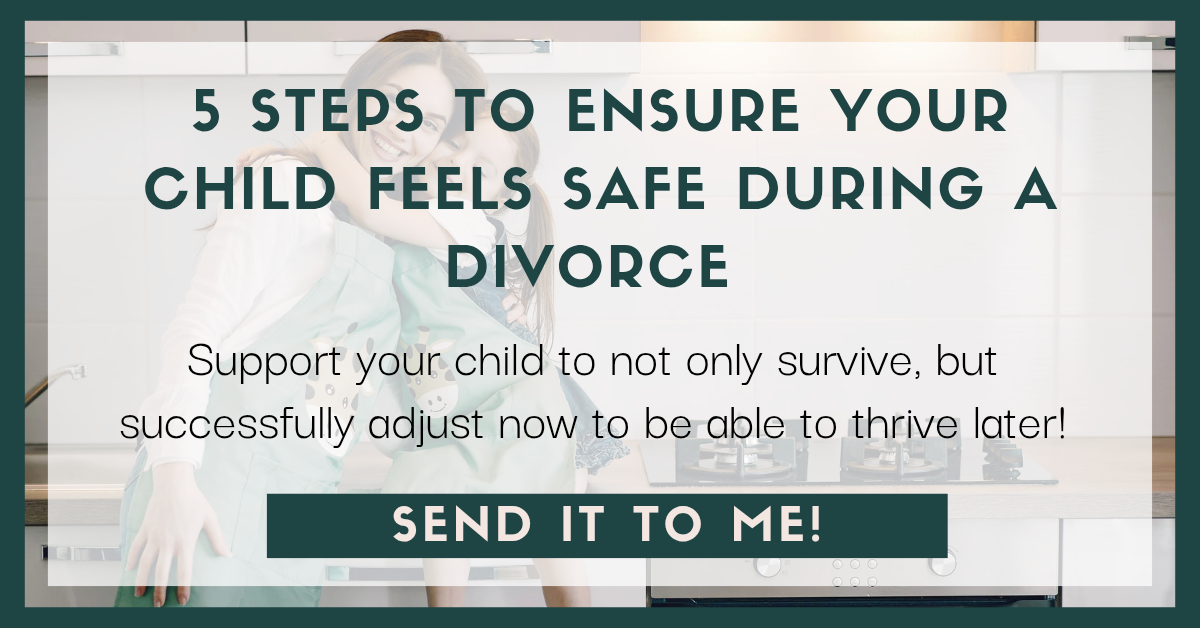Facing divorce is never easy, especially when kids are in the picture. It’s a challenging task and you’d prefer to tackle it head-on. So in this post, I’ll delve into practical tips and guidelines to handle the complexities of divorce without hurting your child or leaving a lasting mark on them.

How To Divorce Without Hurting Your Child (6 Crucial Principles To Follow)
No sugarcoating, just honest advice on how to navigate this challenging terrain with sensitivity and care.
I’m positive that this is what you want the most.
Let’s dive in.
Hi, I’m Jovana, a Clinical Social Worker. Everything I share is based on years of formal education, research, and practical experience working with a justice system supporting parents and children go through the divorce process feeling safe and secure – even when family dynamics change – making confident decisions pre, during, and post divorce.
HOW TO DIVORCE WITHOUT HURTING YOUR CHILD

Navigating divorce with children requires a deep understanding of its impact on their lives.
Here parents must carefully consider child custody arrangements, where they and other parties involved in the process need to take into account factors like parenting history, and everything else affecting the child’s overall well-being. The living arrangements post-divorce vary, and the choice between sole custody, joint legal custody and physical joint custody demands thoughtful consideration, as well.
Incase of living arrangements, structuring schedules of contacts between parents and children post-divorce also requires open communication and flexibility between parents.
At the same time, maintaining communication channels open with children becomes a vital aspect of navigating the divorce process. Considering that parents, as primary figures in their children’s lives, hold the responsibility of addressing fears and concerns during the divorce.
Ultimately, throughout this challenging process, prioritizing the child’s best interests and overall well-being should guide decision-making.
If you want to know the 5 steps you can take to ensure your child feels safe and protected during the divorce, sign up for my FREE 3-day mini crash course by clicking below:
5 STEPS To Ensure Your Child Feels Safe During A DIVORCE (adjusting now to thrive later)
Now let’s focus on the first principle that will ensure you get to divorce without hurting your child.
#1 BE OPEN AND HONEST WITH YOUR CHILD ABOUT WHAT’S GOING ON RIGHT NOW, WHAT IS COMING IN THE NEAR FUTURE, AND ADDRESS ALL THEIR QUESTIONS AND CONCERNS THE BEST WAY YOU CAN
By telling you to be open and honest with your child, I’m aiming to raise your awareness about the child’s need for control and predictability at this moment and not send a message that you need to share every single piece of information, thought, or concern you have on your mind during the process of divorce. Or share responsibility with them in this way.
On the other hand, you do need to share power with them, or, better said, not deny or take their power away.
All of this means that your urge to protect the child needs to be balanced out with the child’s need for participation in anything affecting their life (in)directly.
So when deciding what information you need to share with the child, it’s good to focus on the next few criteria:
- Does the child have the right to know this information? What might happen if they don’t?
- Is this content or information (or the way you tend to communicate it) appropriate or safe for the child to be exposed to?
- Will not knowing the information create unease, anxiety, or despair for children?
- Did the information you want to communicate come as a result of unresolved emotions towards the other parent?
- Can withholding of the information lead to confusion and unpredictability for the child and their life?
- Is the aim of withholding a certain information their protection or protection of you (or any other person) but not children? And what may happen if they know or don’t know this?
- Are you absolutely certain that the information isn’t appropriate for the child or that the child doesn’t have the capacity to absorb and integrate it?
- Did the child ask about the subject directly or indirectly? If yes, do not withhold the information; just find a suitable and sensitive way to address it (ask for help if the sensitivity of the topic is too much for you to handle).
- Is this over sharing? Should the child be burdened by this information? Am I expecting a child to provide me with comfort or take on responsibility that isn’t theirs?
This should help you make the right decision. If you have more doubts, leave your question in the comment section below the post.

On the other hand, what you absolutely HAVE TO communicate with the children are the next things or subjects:
- the fact that you and their other parent are going through a divorce, and explain what this is if they’re unfamiliar with it,
- what the divorce means for them, their lives, and the family,
- that this change won’t disrupt your relationship with them (but don’t just declare this, make an effort to make it happen),
- what happens during this process and how this will or may impact their life, routines, plans, activities, and so on,
- what’s expected of them during this time or what they can expect,
- where they are going to live from now on and with whom and what the contact with the family members will look like (children need to also be included in this decision depending on their age, maturity, capacity, and willingness to take part in this).
#2 AVOID ELIMINATING, GETTING EVEN, GETTING BACK AT, HARMING, OR HURTING THEIR OTHER PARENT OR THE OTHER PARENT’S PRIMARY FAMILY, OR THE CHILD
If you’re hurting the other parent, you’re also hurting the child, so make sure to assess your actions and behavior to detect if there’s any of the above that I numbered.
Even though you may be really upset with your (ex) intimate partner and this makes you want to get even, get back at them, or even hurt them in some way, you need to separate this role and relationship from the parenting role and relationship.
That’s because while you may be experiencing the end of the intimate partnership, you’re still connected to your ex-partner as a parent.
As you can imagine, prolonging an effort for the communication with them to become effective and collaborative won’t lead anywhere, as you’ll have to step up to this task eventually, so why not immediately?
This is both in the child’s and your best interest.
Now, you should know that over time things do tend to settle down as there’s less pressure and the unknown of what’s coming (which makes anyone uncomfortable, not just you).
Keep in mind that this is what happens on average, unless the communication between the parents worsens (or remains equally conflicting) due to different reasons such as a lack of intention, motivation, or skill to improve in one or both parts.
At times, this happens because the parents don’t get the necessary support from the system, but it may also result from the parents lack of motivation to rise to the occasion.
(I won’t get into the specific reasons why this motivation is lacking in order not to overburden this post.)

When it comes to the elimination of the other parent, you should know that unless there’s a safety threat for you and/or the child, this isn’t a legal or legitimate option.
This means that child alienation is always going to be considered forbidden and represent the violence towards the other parent and the children that get instrumentalized in this type of dynamics and are used as a weapon against the other parent.
Finally, when it comes to the other parent’s primary family, know that both them and the children are entitled to a relationship with one another, and this cannot be prohibited by you unless there’s a court order involved.
However, in case of any safety concerns, you can always take the necessary legal action to protect yourself and/or the child.
When it comes to hurting the child, this can happen intentionally or unintentionally and may involve different things, including:
- physical harm,
- physical/emotional neglect and inflicting physical/emotional pain,
- psychological abuse or torture,
- alienation from the other parent,
- neglect and/or dismissiveness of their needs and emotions during this life event and specific situation,
- ignoring their concerns and problems, disrespectful treatment, and belittling,
- punishment or vengeance due to them showing affection towards the other parent and their primary family, etc.
Many of these things may happen because parents don’t understand or know the needs of children who are experiencing their parents’ divorce (or their needs in general), so then they end up making things harder for children or are frustrated by the child’s needs in this life situation and end up dismissing them.
Sometimes this may happen due to the parent’s lack of skill and capacity, and at other times, parents may be under a lot of pressure and facing too many demands, resulting in burnout as they are objectively incapable of responding to everything on their hands.
Just keep in mind that most often parenting capacity may be reduced/weakened in the circumstance of a divorce as a life event, and it’ll get back to balance in the months that come. This means that you may experience a hard time meeting your child’s needs in the same way you could if you weren’t in this type of situation.
Knowing this, to help you ensure your child feels taken care of during a major life event like divorce, I’ve delivered a FREE 3-day crash course on 5 steps to ensure your child feels safe and protected during a divorce, enabling them to adjust successfully while going through this transition. Sign up below:
You may want to read: DIVORCE: WHAT IF A CHILD PREFERS ONE PARENT (HOW TO RESPOND).
#3 FULLY ACKNOWLEDGE YOUR AND YOUR CHILD’S NEEDS AND EMOTIONS AND PAY ATTENTION TO THEIR ATTITUDE, BEHAVIOR, AND ACTIONS BEFORE, DURING, AND AFTER THE DIVORCE
It’s not possible to cover all of this here, but I’ll do my best to cover the basics at least.
I’m mentioning your needs first, as oftentimes parents project their own needs and emotions (including emotional needs) onto the child, which may leave them ignorant of the emotions and needs of children during separation or after it.
At the same time, it may happen that they aren’t responsive to the child’s emotional (and/or other) needs due to dealing with so many difficult emotions of their own, as divorces are challenging, generally speaking.
This, together with the different more or less difficult life conditions any family encounters, may potentially result in children being at risk of experiencing emotional, social, educational, mental health, and other related challenges.
Naturally, this will also depend on the particular child in terms of their characteristics (like age, for example) and resilience.
However, you shouldn’t rely on this but rather focus on recognizing your needs, which are separate from the needs of your child but may be interconnected.
If you’re experiencing difficulties and challenges, there’s no shame in asking for help and support, as that way you’re investing in your and your family’s stability and future.
So for example, if you’re hurt by the separation and defensive or offensive about it and you have the urge to defend your dignity, which will involve conflicting interactions with your ex-partner, this is something that you need but not your child.
What they need are cooperating parents that can establish a stable family environment and meet the child’s needs.
As you can see, this is not about which of the two is a better parent; it’s about cooperation and agreeing on what’s the best solution for the particular child.

So if cooperation is challenging now and you see that you two won’t be able to find common ground, you need to find a suitable resource or service that can respond well to these types of problems.
When it comes to a child’s emotions, you should be very cautious here, as children tend to keep hidden how they really feel, plus they often feel very different than their parents about the separation, so you may be in dissonance at this time.
This is why it’s REALLY important to allow children to express their:
- Feelings
- Thoughts
- Opinions
- Wishes, and
- Concerns.
However, it’s not enough just to enable this; what’s crucial is to actually honor their voice and give the appropriate attention to what they’ve expressed, in accordance with their age, maturity, and evolving capacity to participate in decision-making about matters that affect their lives.
When it comes to a child’s behavior, there’s a vast array of behaviors children may portray, but they will have the best chance for good functioning if:
- they understand the divorce as it’s being appropriately communicated to them,
- the divorce is being handled well (the conflicts caused by separation are not prolonged and intensive), so the best interest of the child is in the middle of all efforts and in the focus of both parents, and
- when a child has a meaningful relationship with both their parents after the separation. (It’s about quality, not quantity, and it’s about consistency—regular contact vs. a sporadic one.)
#4 AT ALL TIMES DURING THE DIVORCE PROCESS, BE AWARE AND INFORMED ON YOUR AND THE CHILD’S RIGHTS AND PROTECT THEM
Each divorce is different, so as you go through it, you need to get more informed on what applies to your particular situation and what doesn’t.
This is one of the most important things, as a lack of information or misinformation may lead to the violation of your rights as well as the violation of the children’s rights.
You don’t need to master this area and know everything, but in that case, what’s important is to have someone by your side who is experienced and skilled. You can’t leave anything to chance, as this is a highly sensitive and delicate matter, and your and your children’s futures are at stake here.
You don’t need to panic here, but I am raising your awareness, as you may not be aware of just how often human and children’s rights are violated and ignored.
When it comes to the legal proceedings that follow life events such as divorce, keep in mind that the children are at risk as they usually don’t have a representative to protect their interests.
Oftentimes, children aren’t seen as separated individuals from their parents, which results in them not having the avenue to practice their rights or fight for them.
This means that you have to be cognizant of this throughout the process of divorce and take the necessary actions to protect your child’s rights. And not see the child as a part of you or even your possession, but see them for whom they are, separate from you and the other parent.

Now, when it comes to your rights, you should know that the violation may occur intentionally or unintentionally, and it is your job to represent yourself or get legal representation that will take suitable action on your behalf or both, depending on the occasion, proceeding, or process.
If the violation occurred intentionally, you still shouldn’t ignore it, as this may easily progress over time.
For instance, if a certain institution that’s included in the process ignores your rights in some way for any reason, over time they may continue to do so if you don’t raise your voice and stand up for yourself.
Sometimes people who are not confrontational or avoid it altogether get overlooked as they portray someone who is fine with how things are going. This is why I advise you to remain attentive and awake, as well as conscious of your needs and rights.
If you’re not used to defending yourself and your rights, I suggest you work on your empowerment and expression of yourself, which may require you to use certain resources or the assurance of others, such as professionals, to do so.
And remember, this will help with other areas of life too.
#5 ALLOW CHILD PARTICIPATION IN THE DIVORCE IN THE DEGREE ACCORDING TO THEIR AGE, MATURITY, EVOLVING CAPACITY TO BE INCLUDED IN THE DECISION-MAKING, AND THEIR WILLINGNESS TO TAKE PART
This is a very sensitive topic that’s surrounded by a lot of controversy, doubts, misconceptions, myths, and resistance from all parts included in the divorce process, including the experts that lead it or have a different kind of role in it.
As most of us haven’t been allowed to participate in the decision-making process about our lives throughout our childhoods and even young adulthood, it’s not unusual for us to be unconscious of our misconceptions around this process, as well as that this is an inherent need that must be honored.

At the same time, what may follow us is resistance towards enabling child participation, as this is so unfamiliar to us—we haven’t experienced it, so it’s so unknown to us—plus we are not skilled and confident enough to lead the process, which creates a lot of unease and uncertainty.
And even fear, as we may be afraid that this will overburden the kids and that they’ll be exposed to maltreatment that they won’t be able to handle.
You don’t need to take my word for it; you can learn the truth yourself. So to be able to be more objective regarding what the child needs in this situation, the best thing you can do is put yourself in the child’s position (imagine being in their shoes or place) in order to think the way they do and feel what they feel.
If you’re able to do this correctly, you’ll quickly learn that having the chance to participate is exactly what they need, and you might even get the urge to advocate for this strongly.
If you’re not there yet at this point, that’s because you may think: Okay, but I’m an adult and they’re kids, so it’s not up to them to decide. Or: They can’t be entitled to the same things as me.
Well, that’s the same resistance stemming from your childhood and/or young adulthood, where you were always the last to have a say or didn’t have it altogether, which is why this is so uncommon and unfamiliar to you.
So move past it and begin seeing a child as an equal who has the same exact rights as you but just needs more protection and guidance than you do.
Our job here is to make this process safe for the kids, not eliminate them from it because it’s not comfortable for us to enable it.
Now, let me quickly point out the most important things to pay attention to here and give you the information and guidelines you need to help you do so:
- All kids are entitled to participate in the process. What’s different is the way in which this takes place (as we need to adapt our approach in accordance with their age, dominant communication type, and maturity), as well as the degree to which they will influence the final decision.
- It is not to be assumed that the child doesn’t have the capacity to form an opinion and participate in the decision-making process. What’s needed is to assume that they do have the capacity until it’s proven otherwise. (Even the babies have this capacity – the participation occurs through observing the attachment with parents as the child’s primary attachment figures.)
- A child must be included in the process, even if all they want to say is that they won’t be sharing their views. The child should never be pressured to take part if they don’t want to, but they must have this opportunity.
- The older and more mature the child, the more weight should be put on their opinion and this opinion should and will have more influence on the outcomes of the process.
- The child will participate in the decision-making based on the right information they’re provided, which means all parts included need to ensure the child gets the information they need to form their opinion.
- All decisions that affect the child’s life directly or indirectly cannot be made without the child being included in them in the shape, form, and level most suitable for the child.
- The child’s capacity to take part in the process is ever-evolving, which means that each child’s capacity needs to be assessed (and reassessed) as each child is different regarding the level of maturity, skill, motivation, communication style, avenue for self-expression and expression of their opinion, willingness to take part, and so on.
- Children do not need to participate in the process if they, for any reason, don’t want to, but you should learn the reason if they are willing to share it with you in order to be sure that this is really the case and they’re not just uncomfortable or scared to share their views. If this is in fact the case, work on empowering them to choose otherwise, but make sure not to put pressure on them to go the way they wouldn’t go if there was no pressure.
- If a child has been manipulated, brainwashed, or emotionally extorted by one of the parents or is in high conflict of loyalty (the child feels like they’re betraying one or both parents by sharing their views), this shouldn’t be the reason not to include the child. What needs to be done here is to let the child take part in the way that they desire and that is suitable or appropriate for them, but not put so much weight on their opinion while making the final decision or decisions.
- A child should have a say on any matter that’s being decided on, as long as the decision, its impact, and its outcomes affect the child and their life indirectly or directly.
- The child should be informed of how their participation will affect or has affected the outcome and decision-making and explained why this is so.
Read: CHILD PARTICIPATION IN DECISION-MAKING (ENSURING EVERY CHILD’S VOICE IS HEARD).
#6 PUT IN REASONABLE EFFORT TO PRIORITIZE YOUR RELATIONSHIP WITH THE CHILD AND FOCUS ON OVERALL LIFE ORGANIZATION TO BE ABLE TO MEET THEIR NEEDS
In the time that comes, you’ll have a lot on your plate, and you might juggle many things.
However, you’ll want to ‘set your priorities straight’ and focus your attention on the relationship with your child, no matter if the child is living with you after the separation or not. In order to get well organized you need to address your emotional needs and state, primarily as this may jeopardize the process.
Separation and divorce are emotionally draining in a way and involve a lot of change that you shouldn’t take lightly, even though you may seem just fine. You may be fine, but you should still pay attention to your own functioning and try to detect how you respond to the changes.
If you don’t address the emotional state, it will be hard for you to give the kids the structure and stability they need after the living structure and conditions change.
If you have this under control, then all you need to do is focus on the life organization now that the living conditions have changed, which will be suitable for all.
A good tip for you is to set boundaries for yourself in order not to overload yourself and spread yourself too thin.
For instance, if you’re the parent who doesn’t live with the kids after separation, even though you may want to see your kids all the time, you need to stick to a schedule that’s sustainable over time.

In deciding on different elements of the life organization you need to include the children at all times, no matter how old they are. Naturally, the older and more mature they are, they’ll have more opportunity to make their own decisions or be included in the decision-making process.
If they don’t want to have a saying, that’s okay, and you should respect this. However, it’s important that you do a little investigation to learn why this is so and if that’s the truth. If it isn’t, make an effort to empower them to step forward with their needs and wants.
Finally, even though prior to the divorce you may have been the less engaged parent (no judgement here), this shouldn’t prevent you from fully stepping into this role. Moreover, this is your chance for a redo that will create a firmer bond and a more secure attachment with your child
IF YOU NEED SUPPORT WITH:
- (pre)divorce and post divorce-related concerns and exercise of parental rights – be sure nothing you care about is left to chance and unaddressed, and get critical insights on the best practices for you which are suitable for your particular situation,
- effective and assertive communication around exercise of parental rights during or after a divorce that supports the child’s best interest – go through this process as easy as possible and with the least amount of challenge, setbacks, or throw offs,
- making sure you create as healthy and as supportive environment for your child as you (reasonably) can now that the family structure has changed.
USE A DISCOUNT CODE FOR A 25% OFF (active until June 10, 2025): Consultations25
If you’re not sure yet, here are some alternatives for your convenience:
Use a code: Divorce25 for a 10% off.
Not quite ready? I got you. Get my FREE 3-day mini crash course explaining 5 steps that ensure your child feels safe during a divorce, since this is a prerequisite for their current and future well-being, allowing them to adjust successfully now and thrive later. Click below to get it:
5 STEPS To Ensure Your Child Feels Safe During A DIVORCE (adjusting now to thrive later)
Latest Posts:
- Simple Safety Measures To Protect Your Family

- The Biggest Benefits Of Adopting A Dog For Your Family (5)

- How To Turn Crafting Into Family Fun Time (6 Ideas)

- Creative Ways To Play With Kids Without Technology

- How To Make Gift-Giving More Special For Kids (4 Ideas)

- How To Do A Prenup Online (What To Expect)

FINAL THOUGHTS ON HOW TO DIVORCE WITHOUT HURTING A CHILD
As we wrap up this post on how to divorce without hurting your child, remember that this is a delicate dance and you should give yourself and them some grace.
I’ve covered the steps to minimize the impact, but it’s crucial to stay flexible and adapt to your unique situation.
By prioritizing open communication, consistency, and putting your child’s needs first, you’re setting the stage for a smoother journey through this challenging chapter.
Keep the lines of dialogue open, seek support when needed, and remember – your child’s well-being and best interest.is the compass guiding you through these uncharted waters.
Here’s to navigating this journey with empathy and resilience.
Thanks for your attention and I’ll see you in my next post! Here’s one:

Note: Although I am a Clinical Social Worker, engaging with this website does not establish a professional social worker-client relationship. The information provided here is for general purposes only and should not be considered professional advice. While we strive to ensure accuracy and reliability, this content is not a substitute for professional guidance. For specific concerns, issues, or situations, it is essential to consult a qualified professional and present your situation. Read the full Disclaimer here.









